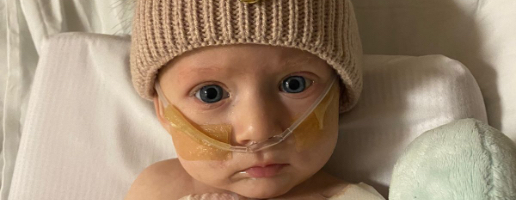Has the pandemic kept you from your regular cancer screening checks? Now is the time to get back on track! Here's why.

When last did you have your regular cancer screening checks done? If you missed these over the past two years, or before that, now's the time to get back on track. Keeping up with them is the only way to catch cancer early on and give ourselves a chance at the best possible outcomes.
Will COVID-19's impact on cancer screening mean people are diagnosed with more advanced cancers?
Globally, February marks National Cancer Prevention Awareness month for many countries. And, on 4 February South Africa marks World Cancer day - an important day to convey the importance of cancer screening - possibly never more so than two years into a pandemic.
That's because, over the course of the COVID-19 pandemic, there's been a decline in people sticking to routine and scheduled cancer screening checks for common cancers like breast, cervical, and colon cancers.
Dr Noluthando Nematswerani, Head of Discovery Health's Centre for Clinical Excellence says, "This global trend - which we also see play out among members of medical schemes administered by Discovery Health - is really concerning."
It's so important to catch the very first warning signs of cancer. Here's why.
Dr Nematswerani explains: "Cancer progresses. So it is classified in stages. Earlier and more localised disease is more amenable to complete removal and to the patient's long-term survival."
"Missed cancer screening checks mean a missed opportunity to catch any signs of cancer as early as possible. Routine cancer screening is therefore very important in catching cancers early on and also in allowing for timely management."
"Advanced cancer is not only associated with poorer clinical outcomes, but also with higher healthcare costs, almost three times higher than the costs associated with the treatment of early disease."
Louise Turner, Chief Operations Officer at the Breast Health Foundation (an organisation which consists of a team of breast cancer survivors, supported by the Discovery Fund) adds, "Breast cancer is one of the most common cancers in women worldwide. In fact, in South Africa, the prevalence is high, with 1 in 28 women at risk of breast cancer. We saw women presenting with severe and advanced breast cancers in 2021, due to a lack of cancer screening in 2020. All in all, early detection saves lives."
What's prevented people from sticking to their scheduled cancer screening checks over the course of the pandemic?
"Contributing factors include stay-at-home orders and movement restrictions that have impacted people's likelihood of seeing their doctor," says Dr Nematswerani. "Then we have possible screening site closures or temporary suspension of cancer screening services at times, all due to prioritisation of COVID-19 services."
"At the same time, throughout the pandemic, people have worried about their risk of exposure to COVID-19 at healthcare facilities, so stayed away from their doctors for this reason too. And during waves of infections, healthcare facilities have been under pressure to allocate and re-direct available personnel and resources towards COVID-19 related care. So, unfortunately, all in all, we're dealing with the aftermath of a perfect storm of factors."
"At Discovery Health, we are working hard to reverse the collateral damage of the pandemic on cancer screening checks and on other important checks too - such those for blood pressure, blood sugar, cholesterol, body mass index and other indicators of the onset of chronic illness."
24% drop in breast cancer screening; 25% drop in cervical cancer screening in 2020
"We are concerned about the impact of delayed cancer diagnosis and initiation of treatment on members' quality of life and prognosis, and on the costs of their care," adds Dr Nematswerani.
When it comes to breast cancer incidence in the Discovery Health administered medical scheme member base, there was a 24% decrease in mammography visits from 2018 to 2020 (year-on-year comparison, per 1000 medical scheme member lives), due to the pandemic.
"Keep in mind that breast cancer screening - through a mammogram - is recommended every two years and cervical cancer screening - through a pap smear - every three years, and this explains why we consider data from 2018 onwards in reaching our conclusions."
- A mammogram uses low-dose X-ray to create pictures of the breast. Doctors use a mammogram to look for early signs of breast cancer.
- A breast ultrasound uses high-frequency sound waves on the breast and coverts them into images.
"The lowest screening rates were seen in April 2020, showing the link between these trends and the strictest lockdown periods in South Africa," adds Dr Nematswerani.
Similarly, from 2018 to 2020 Discovery Health observed an 25% decrease in pap smears carried out among administered medical scheme members.
- Pap smears detect abnormal cells in the cervix before they lead to cervical cancer. Screening can prevent most cervical cancers by finding abnormal cells (pre-cancerous) so that they can be treated before they have a chance to turn into a cervical cancer.
Dr Nematswerani notes, "Incentives - such as Vitality points and rewards - certainly are impactful in helping people to keep up with their screening tests. For example, between 2017 and 2021, we saw a 12% decrease among Vitality members, versus a 14% decrease among non-members doing their mammograms. And, when it comes to going for pap smears, we saw a 10% decrease among Vitality members, versus a 13% decrease among non-members."
Screening tests - what, when and how often?
Routine screening tests are scheduled at specific time intervals depending on one's cancer risk profile.
Screening for breast cancer:
- If you have no family history of breast cancer you should start having mammograms or breast ultrasounds from the age of 40 and have them every two years.
- If you have a family history of breast cancer, start your screening tests when you are ten years younger than the person who had cancer in your family was, when they were diagnosed. Annual screening tests are recommended.
- Breast MRIs and genetic screening are also appropriate in certain cases and your healthcare provider can advise you here.
Screening for cervical cancer:
- If you are not considered at high risk of cervical cancer, then pap smears are recommended every three years and HPV screening every five years. It is recommended that screening should start from age 25.
- Keep in mind that a pap smear looks for precancerous cells that might become cervical cancer if not treated. An HPV (human papillomavirus) test is used to check for the type of HPV that can lead to cervical cancer.
- Annual pap smears are recommended for those who are at high risk (such as people living with HIV). So too is HPV screening, every three years.
Screening for colorectal cancer:
- Stool-based tests are recommended every two years as a general screening tool. And, colonoscopy is recommended for those at high-risk of developing this cancer such as those with a strong family history of colorectal cancer or living with medical conditions that increase the risk of colorectal cancer.
"18% decrease in oncology registrations for Discovery Health Medical Scheme"
Discovery Health also recorded a 18% overall decrease in oncology registrations to the Discovery Health Medical Scheme (DHMS) Oncology Benefit between June 2019 and June 2020. "This means that fewer people were diagnosed with cancer," says Dr Nematswerani. "The figure may be a reflection of a reduction in screening checks and a decrease in cancer diagnoses - which are mainly achieved through elective surgical procedures, and which were deprioritised during the pandemic."
"Fortunately, where medical scheme members were already receiving cancer care, the continuity of care was not impacted by the pandemic as oncology units took the necessary steps and precautions to ensure that members continued to access treatment."
Screening for cancer is key to preventing late-stage cancer
"It's incredibly important is to ensure that everyone who is eligible for cancer screening sets up time to drop in at their screening centre or see their health provider as soon as possible," adds Dr Nematswerani. "Available screening tests can detect cancers even where people have no signs or symptoms of disease, so sticking to routine screening checks ensures we have access to this life-saving technology on a regular basis."
"The take-home message in this discussion is that regular cancer screening is so important. Short delays in accessing cancer screening are perhaps possible to accept, but long delays are really not acceptable."
Related articles

All you need to know: New Assisted Reproductive Therapy (ART) benefit
Discovery Health Medical Scheme has launched an exciting new benefit to support members affected by infertility. The all new Assisted Reproductive Therapy Benefit brings much needed support to couples struggling to conceive.

Cystic fibrosis didn't get in the way of Chantelle's dreams of becoming a mom
One of the most magical moments in 27-year-old Chantelle Van Wyk's life took place on 25 January 2017, when her son, Jonathan, was born. Chantelle has cystic fibrosis, making a successful pregnancy a major undertaking.

Baby Mighty Mack's fight against acute myeloid leukaemia
On 13 May 2021, Mackenzie "Mighty Mack" Friedman was diagnosed with acute myeloid leukaemia (AML). Seemingly overnight, the perfectly healthy six-month-old became a very ill cancer patient in need of urgent treatment - and a bone marrow transplant.